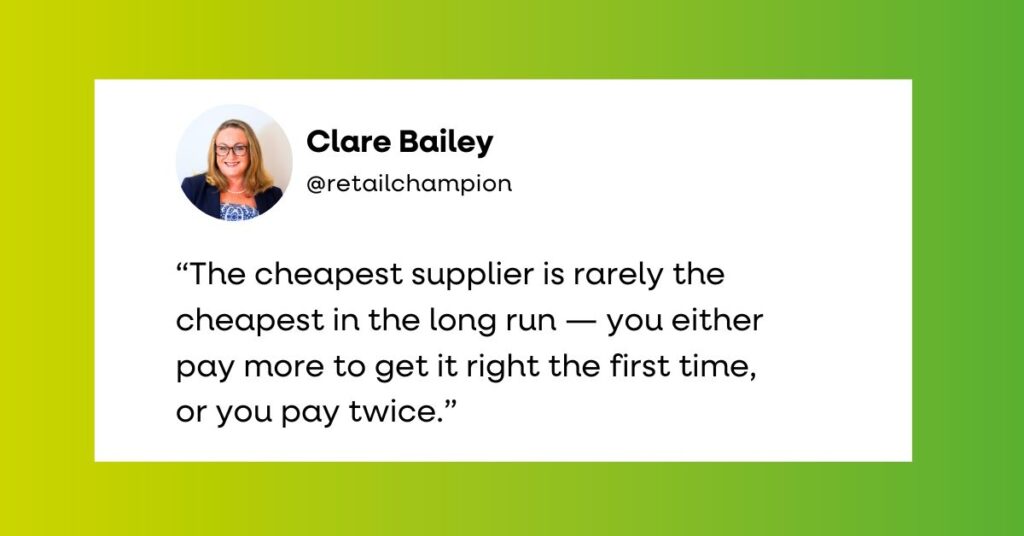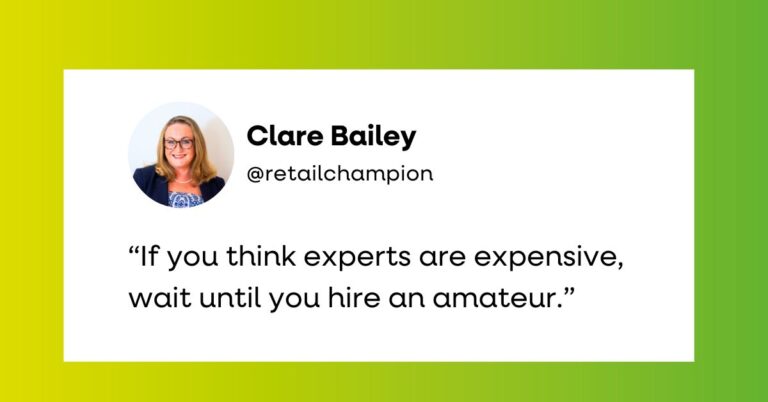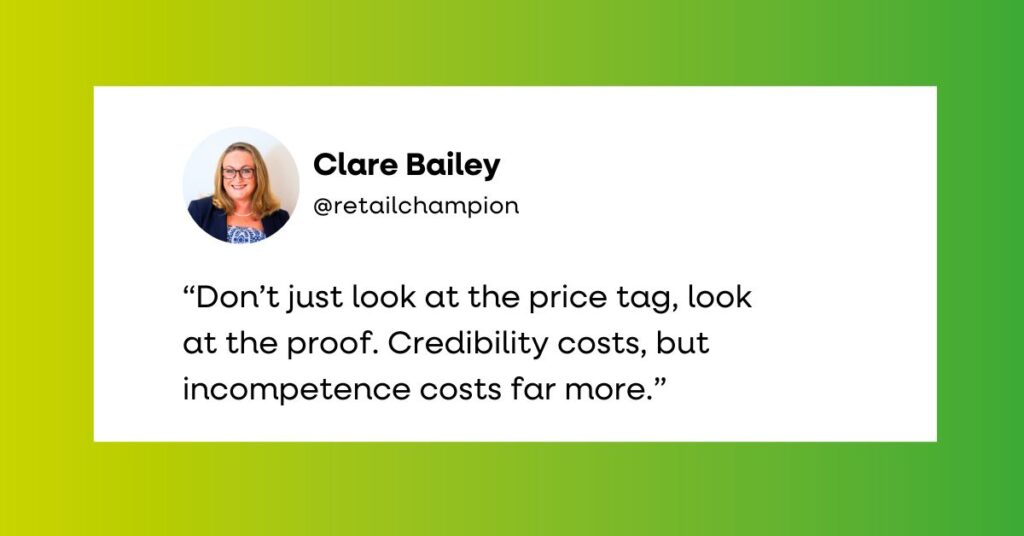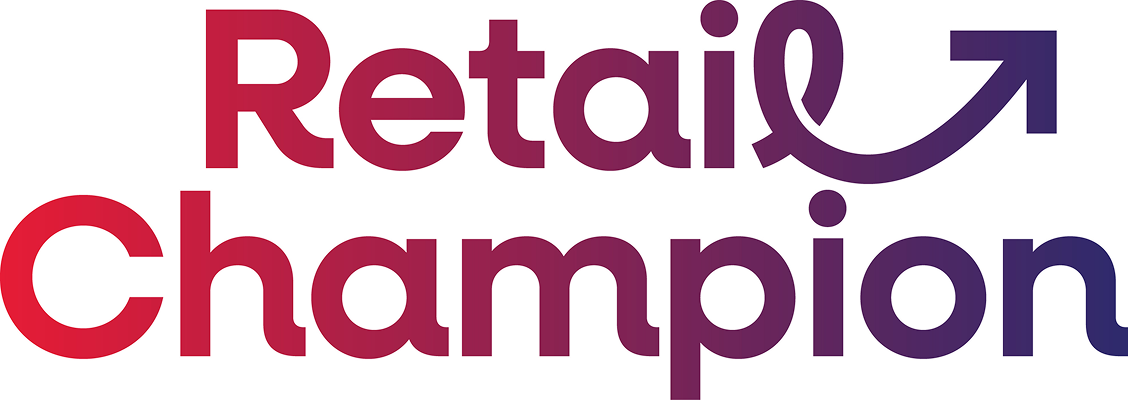
By Clare Bailey, Retail Expert (who has actually been there and done it and written the books!)
There’s a growing epidemic in business: the rise of the self-appointed expert.
They’re everywhere – in retail consultancy, website design, marketing, HR. They’ve got glossy websites, slick LinkedIn profiles, well-rehearsed pitches, and promises that sound almost too good to be true. Spoiler alert: they usually are.
I’ve lost count of the number of times I’ve been up against someone in a bid who has positioned themselves as a “retail and customer service expert.” On closer inspection, they’ve never actually worked in retail. Their experience? A background in customer service but not the operational, commercial, or supply chain expertise that underpins true retail knowledge.
They couldn’t talk about range reviews, seasonal buying cycles, supplier negotiations, or pricing strategies if their life depended on it. But they’ve got a great PR engine, a knack for self-promotion, and they know how to impress in the first five minutes. And people believe them.
Money changes hands. Work is delivered — badly. The client is left wondering where it all went wrong. And by the time they realise, the budget is gone. There’s no money left to fix the mess — whether that’s rebuilding an ineffective website, redoing an unusable training programme, or untangling a failed marketing campaign.
Why We Keep Falling for the Cheapest Quote
It’s not stupidity — it’s psychology. Our brains are wired to look for value, and we often mistake “cheapest” for “best value.”
Anchoring bias: The first price we hear sets a mental benchmark. If Supplier A quotes £20,000 for a high-spec e-commerce site and Supplier B quotes £2,500, our brain sees the £2,500 as a “saving” — without questioning why the gap exists.
The scarcity effect: The fear of missing out on a bargain is powerful. “What if this is all I need and I’m overpaying with the other guy?”
Confirmation bias: Once we’ve made a choice, we look for reasons to justify it. We ignore red flags because admitting we might be wrong is uncomfortable.
The problem is that a price that’s too low should set alarm bells ringing. It usually means one of three things:
Corners are being cut.
Labour is being outsourced to the cheapest possible source (with quality to match).
The supplier simply doesn’t understand what’s required — and has no idea how much work is actually involved.

What to Consider Beyond Price
A supplier who charges more isn’t necessarily overpriced. They might be:
Delivering in half the time, saving you months of lost revenue and missed opportunities.
Bringing decades of experience, meaning they avoid costly mistakes and solve problems before they happen.
Including hidden value — training, strategy, future-proofing — that you won’t get with the cut-price option.
Think about it this way: would you buy a car purely on price, ignoring safety ratings, reliability, and running costs? Then why do it with something as critical as your website, your retail strategy, or your store fit-out?
Protecting Yourself from the Self-Appointed Expert
Demand hard evidence. Ask for detailed case studies and real-world results from businesses like yours.
Insist on references you can actually speak to. If they’re credible, they’ll happily put you in touch with past or current clients who can vouch for them.
Look for congruence. Does their experience match what they’re promising? Someone with a decade in corporate retail will talk confidently about merchandising, footfall conversion, and supply chain resilience. Someone without that background… won’t.
Start small — but paid. I often offer a 10-hour “getting to know you” package at an introductory rate. It’s enough for both sides to assess fit without risking a large budget — and crucially, the client is still paying, which means they value the work.
Ask about process and timelines. A true expert will have a clear, methodical way of working and will be able to explain it in plain English.
Check credentials — not just claims. If they say they’ve worked with big-name brands, find out in what capacity. “I once attended a supplier meeting at X retailer” is not the same as “I delivered a strategic range review for X retailer.”

The Real Cost of Getting it Wrong
Hiring the wrong supplier doesn’t just cost you their invoice. It costs:
Time — weeks or months you can’t get back.
Momentum — opportunities lost while you wait for fixes.
Trust — staff, investors, and customers lose confidence.
Budget flexibility — once it’s gone, it’s gone.
I’ve seen businesses on the verge of tears because they spent £10,000 on a website they can’t use, with nothing left to rebuild it properly. I’ve had retailers call me after engaging the wrong consultant, only to discover they’ve been following advice from someone who has never actually run a store, managed a buying calendar, or set a trading budget.

Your Supplier Selection Checklist
Before you sign a contract or hand over a deposit, ask yourself:
Have they shown me specific examples of similar projects they’ve delivered?
Have I spoken to at least two previous clients to confirm their claims?
Do they have a track record in my industry, or are they trying to stretch their expertise?
Have they explained their process, timeline, and deliverables in detail?
Does their pricing make sense when compared like-for-like with others?
Have they been transparent about what’s not included?
Do I feel confident they understand my business goals — or are they just selling me a package?
Would I still hire them if they charged double? (If the answer is “no,” why am I hiring them at all?)
Final Word
The cheapest supplier is rarely the cheapest in the long run. You either pay more to get it done right the first time or you pay twice: once for the bad job, once to fix it.
In business, your money is a tool. Spend it with suppliers who are credible, competent, and aligned with your goals not just the ones who happen to be the lowest bidder.
Because the real cost isn’t the invoice. It’s the lost time, lost opportunities, and damage to your business when the wrong supplier delivers the wrong result.
And trust me — I’ve seen far too many businesses left picking up those pieces.

Clare Bailey aka The Retail Champion is not a self-appointed expert. She’s a recognised authority with decades of real-world retail experience, built on a career of actually doing the work time and time again.
From developing product ranges and negotiating with suppliers, to running successful retail operations and delivering measurable results for global brands and independent retailers alike, Clare has been there, done it, and delivered it.
She’s worked with businesses at every stage — from high street names to ambitious start-ups — and is known for her no-nonsense, results-driven approach that cuts through the noise and gets things done.
When Clare shares advice, it’s not theory. It’s the same insight, strategy, and commercial know-how that has transformed her clients’ businesses and it’s why she’s trusted by organisations who need expertise they can bank on.
See more about Clare and the rest of the team on our Meet The Team page.
If you’ve enjoyed reading this you may also find this article of interest:


